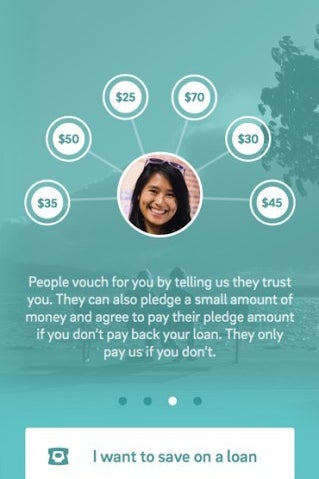

After going through a divorce and getting laid off from her job at Fannie Mae, Yvette Quesada fell behind on some bills. Her credit score was slipping, and she knew she'd never be able to do the things she wanted to do — buy a new car, move away from Philadelphia — if she didn't improve it by paying off her bills. To do that, she needed cash — but, of course, with a low credit score, borrowing from a bank is difficult.
So she turned to Vouch, an alternative lending startup that allows disadvantaged borrowers to leverage their social networks in order to get a loan. After some convincing, Quesada managed to find 10 people she knew who would "vouch" for her, or cosign a portion of her $500 loan.
"It wasn't necessarily for the amount that I wanted, but I appreciated that they were willing to work with me, especially when other companies don't look at what got you to that point, they just say, 'Denied,'" Quesada told BuzzFeed News. Though the interest rate on her loan is "kind of high," she said she expects to finish paying it off in under a year.
Quesada is exactly the kind of person Vouch was created to serve — people who, despite their best efforts, feel they've run out of ways to get the cash installments that would help them improve their credit score. But if Vouch offered Quesada an opportunity, it was a small one, with plenty of stipulations: With 10 "vouchers" and a FICO score above 600, Quesada still got a high interest rate from Vouch. Vouch may be helpful for some, but the concept is hardly radical, and does little to change a fundamentally broken system.
Yee Lee founded Vouch after a stint at PayPal, where many members of Vouch's team also came from, and a handful of social media companies. Lee told BuzzFeed News that he was frustrated with the status quo and thought he could use his background to, if not change the system, at least make it a little more navigable and a little more accessible.
"People who are billionaires already have a really easy time getting access to capital to make the next billion, and it's not fair. Like, literally, it's not fair. They pay lower interest rates. When those deals go bad, there's insurance and all kinds of financial products that regular Americans can't get access to," he said. "It's atrocious to us, to the founding team of Vouch, that that's the situation."
Lee would be the first to say that the concept behind Vouch — a tightly networked community pooling together to support the creditworthiness of a member — is nothing new. In some ways, it's how major financial institutions got started in the United States, with individuals checking up personally on other individuals. Credit circles have long allowed groups of friends and neighbors to come together and share credit to help members get loans. In October, the New York Times reported that these traditional lending circles have recently gained new life in the United States, especially among recent immigrants who haven't been in the country long enough to build up a credit score.
But if Vouch's strategy is rooted in the history of finance, so are its shortcomings. Interest rates for Vouch loans can be as low as 5%, but as high as 30%. Bruce McClary, a spokesperson for the National Foundation for Credit Counseling, says that while he can see the appeal of Vouch, he's not sure it's a game-changer for people with poor credit.
"The sad thing about this is, the high end of that range — to get a rate for 30%, for example — if you live in one of the states where payday lending is regulated, it could be lower. I'm not sure what the appeal there is," he says. It's not clear to McClary why even someone who had been repeatedly rejected from a bank would go through the effort and potential discomfort of pulling friends and family into their finances if they could get a comparable rate from a different, if less attractively packaged, payday lender.
McClary also suggested that individuals considering subprime loans might also turn to local credit unions, which, Lee acknowledged, do often offer starter lines of credit to people with low credit scores. But, Lee argued, these are usually collateral loans, meaning the credit union puts a hold on some of the borrower's funds.
"These are terrific and really effective ways to build up credit score, but they don't really provide consumers with immediate capital," wrote Lee in an email. "Many consumers end up turning to other sources of capital if they really need to quickly make a purchase or cover some financial shortfall." Of course, Lee is hoping Vouch will be the service they turn to, but even if they do, the underlying problem of the FICO system still exists.
Karen Gregory is a sociologist at the City College of New York's Center for Worker Education. She coined the term "creditonormativity" to describe the ways in which the credit system sets expectations that even very industrious and responsible individuals, given a set of unfortunate circumstances, will be unable to fulfill. Could an alternative lending network like Vouch be the solution to that problem?
"Given that FICO is such a strong actor, it does seem like a worthy cause to help individuals take some control over that number, even if that means involving a network of others," Gregory told BuzzFeed News. "I just wouldn't mistake this for a structural fix to issues of bad credit and the overly controlling role that credit scores play in our lives."
If there are, as Lee says, "tens of millions of Americans who are credit underserved," then there's no reason that the Vouch network of the future couldn't be millions of members strong. The bigger the network, the stronger the proof of concept. In a hypothetical world, people could even talk about Vouch scores as a common standard for creditworthiness.
But that scale would significantly alter the relationship that Vouch has with its customers. Right now, Vouch can feel intimate. In the small number of cases in which borrowers have defaulted, vouchers — who are contacted by phone to confirm that they are who they say they are and that they understand what they're getting themselves into — get personalized emails asking them to pay up. But that kind of hands-on operation simply wouldn't be possible for a network of millions. Lee said that, in his time at PayPal, he learned the "black magic art" of how to scale an underwriting operation of that size. That may be true, but PayPal doesn't have to email your mom and tell her you've stopped paying your bills. While Vouch at launch feels personal and secure, Vouch at scale would be an entirely different animal.
Yvette Quesada was recently laid off yet again — but she did receive a severance package. She says she didn't mind revealing her financial situation to 10 people to get a Vouch loan, many of whom she had helped with personal issues such as child care in the past. But had she been able to predict that she was about to receive a severance package, she says, she might not have gone for it. Still, she's happy to have at least some of her financial issues resolved — and she's moving to California in a few months.
"Hopefully they can help other people who are in a more serious situation," Quesada says. "For me, it was serious, but there were other avenues I could have taken. I just didn't want to."
